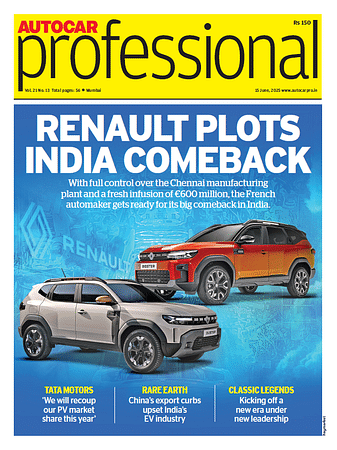India and Sweden to work together on transportation and safety
Several Swedish companies in the automotive business are known to have invested in India with SKF (leading supplier of bearings and related products), Scania and Volvo being the leading names.
Union Minister of road transport, highways and shipping, Nitin Gadkari has announced, via his Twitter handle yesterday that India and Sweden will set up a joint working group to take on the challenges related to India’s transportation sector.
He also met Oscar Stenstrom, State secretary for enterprise and innovation from Sweden, during the Make-in-India Week in Mumbai. It is known that a team of political and industry delegates from Sweden including the Swedish prime minister Stefan Lofven visited India for the conference on Indian government’s flagship initiative.
“Met Mr Oscar Stenstrom, State secretary for enterprise and innovation Sweden along with their industry delegates at Make in India Week at Mumbai, it was agreed to form a joint working group between Sweden and India on transportation and safety related issue(s),” he tweeted yesterday.
The two nations, which have agreed to scale up bilateral relations in near future, share a healthy relationship driven by mutual economic interests.
According to the Indian Embassy’s (Sweden and Latvia) website, India’s international relations with Sweden reached new heights, thanks to the first-ever state visit by the president of India, Pranab Mukherjee last year.
“Bilateral trade (between India – Sweden) crossed US$2 billion in 2009-10. It currently stands at nearly US$2.5 billion in 2014-15. During the visit of the President of India in May-June 2015, both sides agreed to reach the ambitious target of US$ 5 billion by 2017. Most of the major Swedish companies entered India decades ago but in recent years their investments have increased and Indian companies have also begun to invest in Sweden,” quotes the website.
Several Swedish companies in the automotive business are known to have invested in India with SKF (leading supplier of bearings and related products), Scania and Volvo being the leading names.
Both the commercial vehicle manufacturers – Scania and Volvo – have been pushing for environment- friendly technologies such as biofuel-run buses. Scania, for instance, is known for holding several discussions and meetings across the concerned automotive and state bodies for deployment of its biofuel buses.
Autocar Professional has been closely monitoring Volvo and Scania in the context of bringing their respective hybrid bus technologies to India. While this publication was the first to break news about Scania’s decision of importing its biofuel bus for trial-run purposes in October 2013 (followed by April 2014), it also broke news about Volvo (along with Eicher, under Volvo Eicher Commercial Vehicles) now developing its first hybrid bus at its India plant in October 2015.
Although the latter is being built on a school bus platform and is expected to be ready by early 2017, Volvo Buses India is now reported to have delivered its first hybrid buses in India to the concerned transport authorities in Navi Mumbai. Certified by the Automotive Research Association of India (ARAI), the hybrid buses (Volvo 8400 city buses) fall under the government’s Faster Adoption and Manufacturing of Electric and Hybrid Vehicle Scheme (FAME) and will thus receive around Rs 61 lakh as subsidy, taking the total cost of the bus to Rs 2.3 crore.
Scania, on the other hand, is known to have conducted trial runs of its biofuel-run buses through 2014, and found support in Nagpur Municipal Corporation (NMC) for successfully launching its pilot project in the city in August 2015. Nagpur, also a constituency of Gadkari, via NMC and along with Scania India, had commissioned a pilot biogas plant and a pilot facility for at least 100 biofuel (bioethanol and biogas) buses that year.
“I believe that in five years, we will only sell biofuel city buses. We may also have a few hybrid buses in India, but these will be of the biofuel type. And depending on how quickly the infrastructure for biofuel can be built, it will also be possible to have a large proportion of the tourist bus and medium-distance transport vehicles also using biofuel. I also think that we’ll also see a bigger role for biofuel trucks in city transport roles, for example garbage trucks and distribution vehicles that are powered by biogas and ethanol,” quotes Krister Thulin, director, presales and marketing, Scania India in one the write ups on his company’s website.
Dharmendra Pradhan, Union Minister of State for petroleum and natural gas, who has been endorsing the government’s initiatives on biofuels, specially bioethanol, recently quoted that “the oil marketing companies (OMCs) have already invited bids for 120 crore litres of ethanol for blending in petrol for 2015-16 which would be approximately 5 percent of the country’s total petrol consumption.”
Bioethanol is known as a principle fuel that can substitute petrol for road transport vehicles. Produced primarily by the sugar fermentation process, the ethanol production is understood to have the potential of boosting sugar industries, farmers and also address the environment issues.
Clearly, Sweden will have a considerable role to play in helping India lower its vehicular emissions, and the proposed joint working group is estimated to act as a catalyst in the same.
RELATED ARTICLES
Continental exits TBR market in India, shifts focus to car and SUV radials
German tyre manufacturer aims to tap the double-digit market growth opportunity for big SUV and luxury car tyres which w...
New ZF SELECT e-drive platform gives EV makers a choice in 100 to 300 kW range
Modular e-drive platform optimally matches 800-volt overall system and components such as the electric motor and power e...
Daimler India CV and BharatBenz deliver 200,000th truck
Daimler India Commercial Vehicles' portfolio includes truck models ranging from 10 to 55 tonnes for a wide variety of ap...





 By Amit Panday
By Amit Panday
 16 Feb 2016
16 Feb 2016
 6575 Views
6575 Views





 Autocar Professional Bureau
Autocar Professional Bureau




